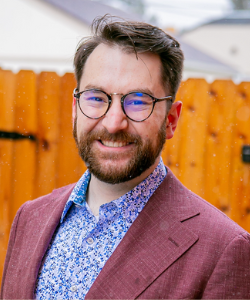About Us
Immigrants and refugees, seeking safety, leave their homes for unfamiliar destinations in search of better lives for themselves and their families. Despite considerable challenges, most immigrants and refugees in the United States lead healthy lives and contribute meaningfully to American society. Even so, adjustment to living in a new host country may be significantly affected by histories of grievous loss and violent traumatic exposures, which commonly precipitate profound emotional distress. Indeed, the prevalence of mental health conditions, especially posttraumatic stress disorder and depression, is high, particularly among refugees, a subgroup of immigrants routinely subjected to extreme traumatic experiences before, during, and after forced displacement. Promoting health in such a context means paying proper attention to these histories since emotional wellbeing is critical to overall health. Accordingly, our program aids in the social and emotional adjustment of immigrants and refugees in need. We provide mental health services with culturally-informed approaches, educate healthcare providers about caring for immigrants and refugees, and increase professional and public awareness of immigrant and refugee community needs.
Mental Health Services
Transition can be difficult, as immigrants and refugees adjust to new schools, work environments, and American culture, often with an added burden of lacking adequate resources to meet their most basic needs. Additionally, many of our clients continue to suffer from trauma that they experienced in their home countries or during migration. We provide mental health services with culturally sensitive approaches to aid the stability, social, and emotional adjustment of immigrants and refugees. Our therapists aim to help those in distress to recover a sense of individual well-being and to improve relationships among family members. Our psychiatrists assist with diagnostic evaluation, offer judicious prescription of psychiatric medication when indicated, and sometimes conduct therapy themselves. Often, refugees are unaware of the services available to help them get settled. We offer case management services, helping immigrant and refugee clients navigate and access complex healthcare and social services systems. While some of our providers have facility with certain languages, we most often rely on the help of our pool of trained interpreters to aid in communication with our clients.
Education and Training
We provide interprofessional and interdepartmental teaching in immigrant and refugee mental health at CU Anschutz. Our students include psychiatry trainees, social work interns and faculty in the department of psychiatry. We provide case consultations with providers in other medical specialties, including internal medicine, pediatrics and neurology.
Our Staff
We have highly skilled, culturally informed psychiatrists, social workers, and professional counsellors on our team who have extensive experiences working with refugees and immigrants.

Dr. Daniel Savin has worked with immigrants and refugees for over 30 years, beginning in the early 1990’s as a volunteer psychiatrist for Cambodian refugees at the Thai-Cambodia border. He founded and currently directs our Immigrant and Refugee Mental Health Program. Dr. Savin, a Child, Adolescent and Adult Psychiatrist, is a Professor of Psychiatry at the University of Colorado Anschutz School of Medicine Department of Psychiatry and has also taught for many years at the University of Health Sciences, Phnom Penh, Cambodia. Additionally, he is a staff psychiatrist at Jewish Family Services and the Asian Pacific Development Center. He speaks and provides treatment in Spanish and Khmer.

Dr. Ahmad Adi, MD, MPH currently serves as an Assistant Professor as well as the Associate Program Director of Forensic Psychiatry Fellowship at the University of Colorado Anschutz School of Medicine, Aurora, CO. In these roles, Dr. Adi serves as a faculty member in general and forensic psychiatry where he provides clinical services, forensic evaluation, and trainee supervision. Dr. Adi’s research interests include forensic evaluations in immigration courts and mental health in humanitarian disasters, and he provides trainings on conducting these evaluations locally and nationally. Dr. Adi provides psychiatric services to immigrants and refugees at the University of Colorado Anschutz in English and Arabic.

David Alan Harris is a Licensed Professional Counselor (LPC), a National Certified Counselor (NCC), and a Board-Certified Dance/Movement Therapist (BC-DMT), who has been providing individual and group therapy to refugees, asylum-seekers, and other immigrants since 2000. In working for two decades with survivors of extreme traumatic experiences associated with war, organized violence, and marginalized status, David has specialized in fostering mind-body connection as a pathway to recovery. David’s aim to support survivors in their struggle to restore dignity and well-being after human rights violations led him to supervise a mental health team for some two years in a war-ravaged corner of Sierra Leone, following a prolonged conflict that had decimated civilian populations. He trained counselors there and in Liberia, and with them introduced the first formal dance/movement therapy groups in West Africa, including the first anywhere for former child soldiers. David has since published scholarly articles and book chapters on this work and has lectured about trauma recovery on five continents.
.png?sfvrsn=431e9fba_0)
Farduus Y. Ahmed, MSW, ST, LCSW, is a Senior Instructor in the Department of Psychiatry at the University of Colorado Anschutz School of Medicine and the Associate Program Director for the CU-Medicine Immigrant and Refugee Mental Health Program. Ms. Ahmed has over a decade of experience working with various groups, particularly refugees and immigrants. Her involvement in this field began in 2008 when she started working in East African refugee camps and urban areas as a teenager. As a CBT psychotherapist specialized in trauma and mental health issues affecting refugees and immigrants, she provides culturally responsive and trauma-informed clinical services that address complex challenges, including trauma, migration-related stress, war-related trauma, post-resettlement stressors, sexual dysfunction, gender-based violence, and issues like Female Genital Mutilation/Cutting (FGM/C). Driven by the urgent need to provide culturally informed services for trauma survivors, Ms. Ahmed is devoted to creating pathways for healing and resilience within the communities she serves.
Ms. Ahmed is also a faculty clinician, educator, intercultural consultant, researcher, and seasoned community leader. She engages in various teaching activities across campus, including clinical settings and in the community at local, regional, national, and international levels. Provides interprofessional and interdepartmental instruction on critical topics such as refugee and immigrant mental health and wellness, migration and trauma, cultural competency, and health equity, while also addressing health disparities. She utilizes her firsthand experience as a former refugee to enhance all teaching activities related to these issues. Having immigrated from East Africa, she possesses a unique understanding of the needs of communities and the obstacles individuals face while navigating new environments.
In addition to her teaching and clinical work, Ms. Ahmed offers consultancy services to support refugees and immigrants, providing expert opinions, program analyses, training, and tailored recommendations aimed at promoting health and wellness, self-sufficiency, integration, and empowerment, further enhancing her impact as an educator and community leader.
Frequently Asked Questions (FAQ)
- Do you accept Medicaid? Yes. We accept Colorado Medicaid and Medicare
- Do you accept private insurance? Yes. We accept most major commercial insurance plans.
- Do you offer telehealth services? Yes. Most of our services are offered in person and via telehealth.
- Do I need a referral? No. We accept both provider referrals and self-referrals.
- Are services available for children? Yes. We offer services to support all family members, including children and adolescents.
- How do I schedule an appointment? If you or anyone you know may be interested in scheduling an appointment, please send an email to: Farduus Ahmed [email protected]